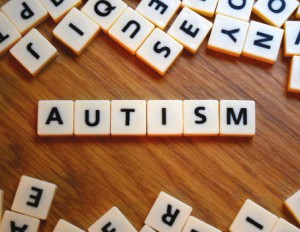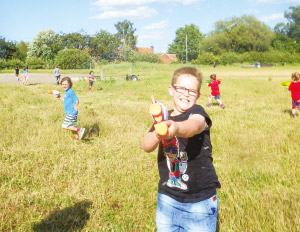
Talking about Autism and Asperger Syndrome
Monday 21st November 2016Chris Bonnello, former Primary School Teacher and autistic BB Company Captain, shares insights into how best to provide for our Companies’ children on the autism spectrum.
Due to a recent drive to include disabled and disadvantaged children in mainstream settings, there are more children with autism in The Boys’ Brigade than ever before. We have a choice between seeing this as a challenge, or seeing it as an opportunity. After all, our whole reason for working in The Boys’ Brigade is to build and guide young people, and youngsters with autism in particular may need the building and guidance we can provide!
Speaking as an autistic man who grew up to become a Captain and a teacher – almost entirely thanks to a Boys’ Brigade upbringing – I have a few insights from personal and professional experience.
“I don’t know what a natural leader is, but it’s not me. Teachers are made, not born – and The Boys’ Brigade was crucial in helping me build up the skills to become everything I became.”
Here are 10 things to consider when providing for autistic children within our Companies:
1. Every autistic child is different!
Yes, this is number one for a reason. Some children on the spectrum grow up to need round-the-clock care, and others grow up to be university professors. Some have communication difficulties, others do not. Some have incredible memories, others do not.
I could give endless information about “how to work with autistic children”, but the most important advice I can possibly give is this: know them as a child before knowing them as a syndrome.
2. Take their anxieties seriously.
Autism and anxiety often go hand in hand. And it makes sense: if you were made to feel isolated or different from others (or in my case, feeling like you were born on the wrong planet), wouldn’t you feel anxious too? Sometimes, anxiety is caused by complex neurology. Sometimes it’s caused by life experience. Sometimes it’s both.
Either way, children with autism can get anxious over what appear to be fairly trivial things (e.g. a change in routine, a lost pencil). But please remember – even if they seem ‘silly’ to you or the other children – to them, the anxiety feels very real.
Fact
Between 1-2% of the general population are on the autism spectrum: about 700,000 people in Britain.
This is an increase from 1 in 10,000 fifty years ago: the rise is due to increased understanding of autism in recent years. (In 1995, aged ten, the psychologist just told me I had a ‘slightly odd personality’!)
3. Sometimes their senses can be oversensitive (or undersensitive).
People with autism often experience Sensory Processing Disorder (SPD) or at least traits of it. This can result in the brain interpreting sounds as too loud, lights as too bright, physical injuries as not painful, and so on. Examples of this can involve children being distracted by tiny noises in the background, or feeling almost physical pain from another person shouting.
When helping with children who have these issues, find out which of their senses are more (or less) sensitive than other childrens’, and adapt your activities where necessary so their brains don’t feel under attack.
Fact
Only 15% of us are in full-time employment. I have three university degrees, but have spent less than two years in that 15%.
4. Things are easier when they’re predictable.
Not all of us are reliant on routine, but plenty of us are. Unexpected changes lead to not knowing what’s about to happen, and this can be a big anxiety driver. So if a child with autism repeatedly asks what the group are going to do next, try not to feel irritated!
Depending on the child’s needs or the severity of their autism, sometimes a timetable description at the start of the evening will work, and sometimes a physical timetable on the wall may help them. But (and I recognise the difficulty with this) – whatever timetable you assure them of, do your utmost to truly stick to it!
5. Give them time.
I often compare myself to a car with slow acceleration but a brilliant top speed. And sometimes, it takes a while for the thoughts in my brain to become actions through my hands or words in my mouth. (When you think about it, the process of turning your thoughts into specific lip and tongue movements is surprisingly complex). People with autism may take a few seconds longer to process things. Give them time, even if you need an answer in a hurry.
Fact
Autism cannot be cured (but the right support and opportunities can help enormously).
6. Have good relationships with their parents.
Obviously I’d give this advice for working with children in general. In teaching too, parents who are on the same page can be powerful allies. But there are extra reasons when special needs are involved:
• Professionals can teach you about autism, but parents can teach you about the child.
• Parents will know which strategies in particular have worked with their child, and which topics will engage them.
• It’s possible that some parents affected by special needs may feel as socially isolated as the child. Having good relationships with their local BB staff could really mean something to them, especially if they know their child also has a safe place outside the home.
7. Focus on their strengths, not just their weaknesses.
My adulthood would have been very different if my BB Captain had concentrated on my deficiencies rather than my strengths. You don’t become a teacher and a BB Captain by having your weaknesses reinforced! All children, regardless of academic or social ability, have skills and strengths. In my experience, BB leaders can be vital for spotting these skills and providing opportunities for the children to use them. (Again, I would give this guidance when working with children in general. But I make a real point of it regarding children with special needs, because it’s so easy to fall into the trap of assuming inability until proven otherwise.)
Fact
Most other statistics I could include here would also sound pessimistic, but the future can be very bright for those whose needs are catered for.
8. There is nothing ‘wrong’ with autistic children.
I know plenty of autistic people who say “I don’t suffer from autism. I suffer from other people’s attitudes towards autism.” If an autistic child grows up around adults who think there’s something deficient about them, they’re pretty much instructed to believe it themselves. People often claim that children on the autism spectrum aren’t very perceptive, but any child can tell when they’re not being believed in. This final point isn’t just about not telling the child there’s something wrong with them, but also not thinking it. Underestimating thoughts lead to underestimating words and actions, and the child will pick up on it.
And yes, sometimes it sucks having anxiety issues, sensory disorders and so on. But honestly, I wouldn’t trade my autistic personality for the world. And nobody else should want me to.
Conclusion
Of course, there is so much more to say that I’ve not had room for. But I’ll finish with this.
Like anyone else, autistic children flourish when they know they’re around people who are rooting for them. And we all know how brilliant The Boys’ Brigade is at providing an environment where the children feel believed in. You may find your members across the autism spectrum to be endearing, challenging and fascinating all at once, and there is so much they can add to your Company if they are well provided for. And you never know, you may have a future Captain among them.
Chris Bonnello
Follow Chris on Twitter @AutisticNW
Chris Bonnello leads seminars and training sessions nationwide, and writes articles for his website autisticnotweird.com. For further details about speaking engagements (or general questions arising from this article), he can be contacted at autisticnotweird@hotmail.com, or through his website.
Further resources for understanding Autism
National Autistic Society: autism.org.uk
NHS Choices: nhs.uk/conditions/autistic-spectrum-disorder
World Autism Awareness Week 2017
Get involved with Autism Awareness Week in 2017 which takes place from Monday 27th March to Sunday 2nd April. It’s all about raising money and awareness so that as many people as possible learn about the challenges, features and reality of autism.
Check out autism.org.uk/get-involved/






